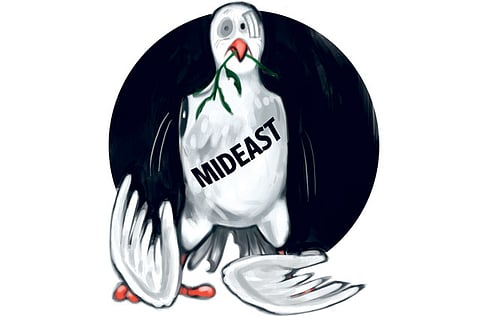Repairing the damage in Middle East
It is difficult to see how the Obama administration would be able to bring about a settlement to the decades-old conflict

The 2003 US invasion of Iraq was a watershed development in the politics of the Middle East. Its geopolitical implications match or even exceed those of the 1967 Arab-Israeli war. The unwarranted assault on Iraq eliminated a key Arab country from the regional balance of power, permitting the rise of regional hegemons and the downfall of others.
As a by-product, it led to the destruction of the decade-old Syrian-Saudi-Egyptian alliance and ushered in a new phase of Arab Cold War. The elimination of the Taliban regime in Afghanistan and Saddam Hussain's in Iraq removed key impediments to Tehran's ability to project power and influence across the region. Discovering the limits of the US military power in both Iraq and Afghanistan has also emboldened Tehran and heartened its pursuit of nuclear power.
Furthermore, the George W. Bush administration's approach to the Middle East following the 9/11 attacks has benefited another major regional power, Turkey. Instead of taking sides in the conflict between the pro and the anti-US camps over the future of the region, Turkey distanced itself from Israel, mended fences with the Arab world and established itself as indispensable broker in most of the region's problems. The rise of ‘new' Turkey altered the Middle East security structure in a fundamental way, rendering it alongside Iran as key middle power in the ‘golden triangle' — the Middle East, the Gulf region, and Central Asia and the Caspian Sea.
Having smashed the regional balance of power, the Middle East peace process was another victim of the US policy under president George W. Bush. Taking advantage of the full backing of Washington, the government of former Israeli prime minister Ariel Sharon dropped the peace process altogether and initiated a new policy of unilateral disengagement.
Sharon proposed a barrier to separate Palestinian towns and cities from Israel and offered to return 42 per cent only of the West Bank — reduced later to mere 29 per cent — to the Palestinian National Authority, while annexing the rest. Israel re-occupied the territories ceded to the Palestinians following the Oslo Accords and eliminated the historic leadership of the Palestinian nationalist movement, represented by the late Yasser Arafat.
Israel utilised the Bush administration until its last days and attacked Gaza in December 2008, wrecking havoc across the tiny Strip. Two years earlier, it exploited the kidnapping of two Israeli soldiers by Hezbollah to avenge its May 2000 forced withdrawal from South Lebanon.
Clearly, if the intention of the Washington's neo-cons was to change the Middle East status-quo, which was — right or wrong — held responsible for the attacks of 9/11, one must admit that that has been done, at a great cost though for both the US and the Arab world.
With the end of the Bush era, the US and the Arabs, the two major losers of the ill-fated Iraqi venture, began an effort to repair, or at least, contain the damage. The Obama administration has withdrawn the bulk of the US combat forces from Iraq, hoping for complete disengagement by the end of 2011. This was accompanied by serious efforts — with mixed fortunes though — to undercut Iran's regional influence.
Syria and Saudi Arabia have buried the hatchet after five years of unprecedented animosity. Their renewed co-operation proved vital for stability in Lebanon and is expected to have positive impact on the formation of a national unity government in Iraq. Indeed, there will be things that will never go back to where they were in the pre-invasion era such as rebuilding the Iraq-Iran balance of power. Syrian-Egyptian relations are not of that sort although it remains difficult to see the tripartite Syrian-Saudi-Egyptian axis back in place any time soon.
It was astonishing though that Syria's relations with Saudi Arabia were much easier to repair compared to those with Egypt. Given the serious differences between Riyadh and Damascus over Lebanon, Iraq, Iran and the Middle East peace process, it was expected that Syrian-Saudi relations would be much too difficult to mend. That assumption proved erroneous.
As far as the peace process is concerned, although US President Barack Obama has succeeded in bringing the Israelis and the Palestinians back to the negotiating table, it is very difficult to see how he would be able to bring about a settlement to the six-decade old conflict.
Regardless, over the past 18 months, the Obama administration and the key Arab players have been trying to repair the damage caused by the policies of the previous US administration. They might succeed in putting certain things back in place. There will however be other things that will prove extremely difficult to repair.
Dr Marwan Al Kabalan is Director of the Damascus Centre for Political and Economic Studies in Syria.



